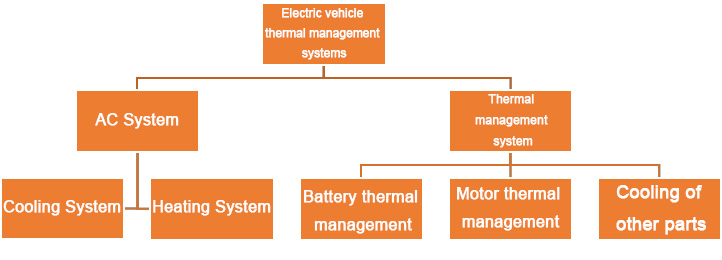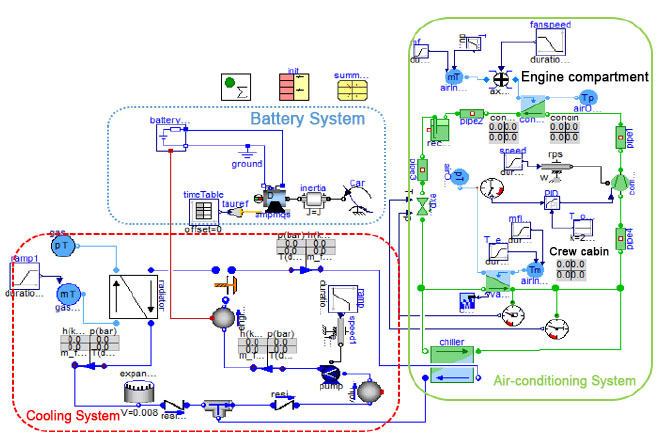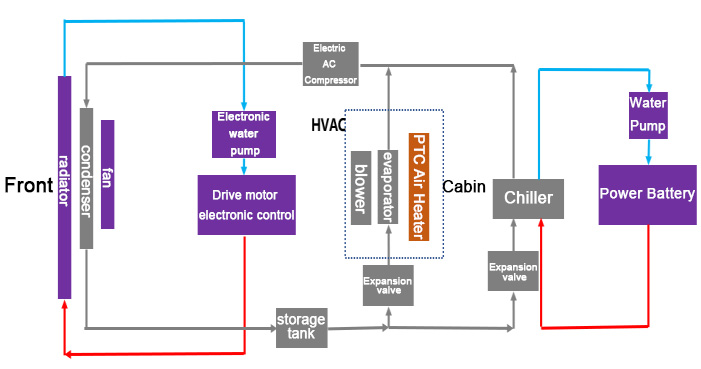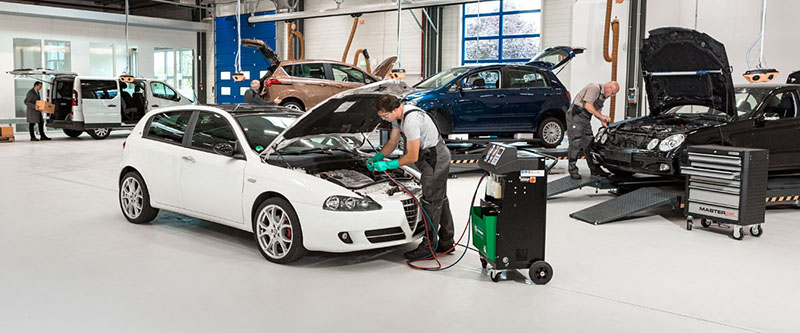The development of new energy vehicles has been paid more and more attention globally in recent years, and is expected to solve the environmental pollution problems caused by traditional fuel vehicles.
The biggest difference between new energy vehicles and traditional fuel vehicles is the power system, which in turn leads to huge changes in thermal management and air conditioning systems. In the post, Guchen EAC will detail a novel air conditioning design in EVs -
heat pump air conditioning system & technology.
◆ Heat Pump Air Conditioners Have Become the Future Development Trend
The difference from traditional fuel vehicles is that the air conditioning system of new energy vehicles is driven by electric energy, and the heating solution includes PTC and heat pumps. The advantage of heat pump air conditioning over PTC heating is that it is more energy-efficient, and it has been rapidly promoted for heating electric vehicles.
◆ The Accelerated Rise of China Local Companies in the Heat Pump Air-Conditioning Market
The traditional foreign thermal management leaders, Denso, Valeo, Hanon, and Mahle, accounted for 55% of the global market in revenue in 2018. They have strong technical advantages.
The advantage of China's domestic enterprises with core thermal management components is that they are sensitive to market demand and can adapt to the current development rhythm of new energy automobile companies at home and abroad. For new energy vehicles, the power source of the air conditioning system is changed from the original engine to the power battery, and the technical solution needs to be redesigned.
Generally speaking, in the wave of automobile electrification, the existing competitive landscape of automobile thermal management air-conditioning has shown signs of loosening, and there is the possibility of Chinese companies overtaking in curves.
Investment Opportunities in China's Electric Vehicle Heat Pump Air-Conditioning Industry
The value of the single-vehicle air-conditioning system of EV has greatly increased compared with traditional fuel vehicles. The value of a single vehicle is about 7000~8000RMB (if heat pump air-conditioning is used, it is about 10000RMB), which is about twice as high as that of traditional fuel ones. Among them, the value of the air-conditioning system (traditional refrigerant) of new energy vehicles is approximately RMB 3,950 per vehicle, which is significantly higher than the value of RMB 1,610 per vehicle of traditional fuel vehicles. In 2025, China's new energy vehicle penetration rate target is 25%. Based on this calculation, the domestic sales of new energy vehicles are expected to reach 7.1 million in 2025. The space corresponding to the thermal management system is about 50 billion RMB, of which the value for the air-conditioning system is about 28 billion RMB. With the popularization of carbon dioxide heat pump technology in the future, it is expected to be further improved.
 Electric vehicle thermal management
Electric vehicle thermal management
AC System Plays an Important Role in the Thermal Management System
For electric vehicles, the thermal management system includes AC system, battery thermal management, electric motor thermal management, and cooling of other equipment.
The biggest difference between new energy vehicles and traditional ones is the power system. The former converts electrical energy into mechanical energy, while the latter converts chemical energy into internal energy and then into mechanical energy.
 New energy vehicle thermal management solution
New energy vehicle thermal management solution
1.The traditional fuel vehicle thermal management system is built around the engine (the engine drives the air-conditioning compressor and water pump to operate, and the cabin heating comes from engine waste heat). As for new energy vehicles, there is no engine or the engine works only part of the time, which requires the
electric car ac compressor and water pump to be motorized. Additional methods (PTC or heat pump) are needed to heat the cabin;
More info.:
For new energy vehicles (especially pure electric vehicles), there is no engine as the power source of the air-conditioning compressor, and there is no engine waste heat that can be used to achieve heating and defrosting effects. Generally speaking, the cold source, heat source and other energy sources of the air-conditioning system of new energy vehicles come from batteries.
2.The power battery of new energy vehicles requires fine heat dissipation and heating management. Compared with fuel vehicles, new energy ones have added power battery thermal management circuits (chiller, battery cooling water plate, valves, PTC, etc.).
 New energy vehicle air conditioning system
New energy vehicle air conditioning system
The Current Heating Solutions of EV air-conditioning System Includes PTC and Heat Pump
In the current mainstream air conditioning systems for new energy vehicles on the market,
(1) Cooling: Electric compression refrigeration is basically adopted. For example, the refrigeration of Guchen
electric bus air conditioning system adopts the refrigeration cycle of "
electric bus compressor - condenser - expansion valve - evaporator";
(2) Heating: mainly includes PTC (liquid/air) and heat pump systems.
For example, Fox new energy vehicles adopt PTC heating when the temperature is low or when the vehicle starts. When the motor temperature reaches a certain value, the motor waste heat plan is adopted.
Tesla Model-X heating mode adopts PTC air heating solution, which is more efficient than liquid PTC.
PTC: Positive Temperature Coefficient, generally refers to semiconductor materials with a large positive temperature coefficient.
Heat pump is a device that transfers heat energy from a low-level heat source to a high-level heat source.
Extension Reading:
Detailed Analysis of BYD's Electric Vehicle Heat Pump Air Conditioning Technology
Detailed Explanation of the Thermal Management System of Xpeng P7





